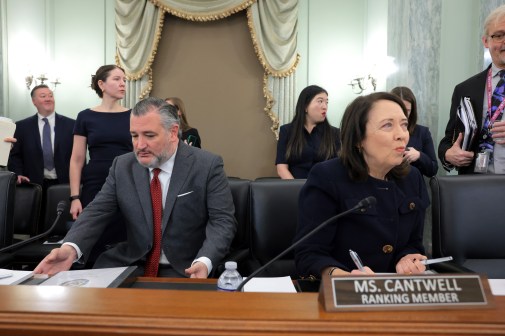Purging cyber review board was ‘a great idea,’ DHS deputy secretary nominee says

Expelling all members of an independent federal cybersecurity advisory panel as it was investigating Salt Typhoon was necessary due to previous leadership and the board “going in the wrong direction,” President Donald Trump’s nominee for deputy secretary of the Department of Homeland Security said Tuesday.
Troy Edgar, who is serving as a senior adviser to Homeland Security Secretary Kristi Noem as he awaits confirmation, called the Trump administration’s decision to dismiss Cyber Safety Review Board members a “great idea” during his testimony before the Senate Homeland Security and Governmental Affairs Committee.
In response to questioning from Sen. Andy Kim, D-N.J., Edgar said that as an adviser he wasn’t the one who made the decision to dissolve the CSRB, which had been reviewing the staggering — and ongoing — breach of U.S. and global telecommunications systems by the Chinese-linked group. “But I think it was a great idea,” he said. “I think that [the Cybersecurity Infrastructure Security Agency], with that steering committee, I think they need to be reconstituted.”
Edgar, an IBM executive who also served at DHS during Trump’s first term, said CISA has taken over the investigation into Salt Typhoon as the CSRB is overhauled. Kim asked why the board — whose membership included federal cyber leads across agencies as well as private-sector experts — needed to be decommissioned.
“I thought it was decommissioned because it was going in the wrong direction,” Edgar said. “It starts with the leadership there.”
Though the CSRB’s investigation into Salt Typhoon has ceased, the FBI’s own investigation continues. Cynthia Kaiser, deputy assistant director in the bureau’s cyber division, said last week that Salt Typhoon has been “indiscriminate” in its collection of Americans’ data as it lingers in telecom networks. The hackers have successfully exploited compromised infrastructure, threat intelligence researchers say, blending their activities with regular operations accessed via trusted infrastructure.
The CSRB, which was established under former President Joe Biden’s 2021 executive order , had notable supporters on Capitol Hill, including Rep. Bennie Thompson, D-Miss., ranking member of the House Homeland Security panel. The chair of that committee, however, backed Trump’s move to start fresh.
“It is worth remembering that while the CSRB is meant to be an impartial body, its members were appointed by the former Director of CISA,” Rep. Mark Green, R-Tenn., said in a written statement. “Given the CSRB is tasked with investigating significant cyber intrusions — such as the Microsoft Exchange incident my committee examined last year — President Trump’s new DHS leadership should have the opportunity to decide the future of the Board. This could include appointing new members, reviewing its structure, or deciding if the Board is the best way to examine cyber intrusions.”
The Trump administration’s remaking of CISA has gone beyond the CSRB: the agency in January placed its election and disinformation officials on administrative leave, and more than 130 probationary workers were fired earlier this month. Kim asked Edgar for the reasoning behind those most recent dismissals.
“As a senior adviser, I wasn’t responsible for that,” Edgar said. “If you look at this outside of federal government … this is something that all Fortune 500 companies do. To me, this does not seem out of the norm. And you would normally go to reflect on more junior people, especially if you had to make a head cut reduction and you needed to be able to go through a process to be able to get to that. So to me, this seemed totally logical.”






